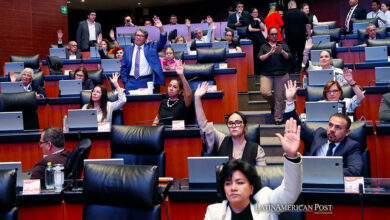Digital marketing: women, their footprint and impact on major brands
Listen this article
Women show that they generate more and more impact and open spaces in the sectors related to marketing and the digital economy
EXMA will take over Colombia. This is an event previously known as Expomarketing, representative for Digital Transformation, brands, customer experience, new strategies, and business models that move the world of Marketing today.
Leer en español: Marketing digital: mujeres, su huella e impacto en las grandes marcas
Its organizers decided to carry it out on May 27 and 28 in this Latin American country because of the movement generated by the government itself and by the disruptive and totally innovative companies of Colombian origin that have marked a new horizon, according to Fernando Azures, his creator and promoter.
It will also shape the marketing community in Latin America counting on exceptional figures such as its 60 speakers, who have stood out for making a difference in these areas.
In this framework and as a representative of women entrepreneurs, one of the speakers will be Verónica Ruiz del Vizo and we had the opportunity to interview her for The Woman Post. Her profile denotes her as a young woman with a broad and outstanding journey that invites one to observe her closely. Of Venezuelan origin, founder of the agency MashUp, where she has designed key strategies for brands such as DIAGEO, MasterCard, Pepsico, Reebok Latin America, Furutaris in Peú and Ecuador, Nestlé, among others.
TWP: there are few girls and young women who have the opportunity and the dream to start a business, because they think it is very difficult and that it is a context led by men. You started at age 16 and we want you to share what made that difference in you to get where you are.
VR: I have thought a lot about this, because I have really noticed that women are afraid to arise and that it is not easy for them to see themselves in a prominent position and for me, the family was decisive. Women were always very strong, always linked to work, to production. As a result of the divorce of my parents, my mother always had high positions in very important companies of the pharmaceutical sector in Venezuela, my country of origin.
TWP: In what sense was it a motivating element to have the model of women's work as dignification and project of life?
VR: I always pointed out that being active and working was something natural, that it provided mental health and benefits of family tranquility and the "formula" to achieve goals. In addition to my mother, who died when I was 17 years old, the most important woman in my life was my paternal grandmother of Cuban nationality, also highlighted by being a professional who was always present and instilled in me independence and autonomy.
TWP: Is studying at a girls' school, as is generally believed, an advantage or a disadvantage?
VR: Contrary to what it is considered beneficial to study in mixed schools, in my case I think it was very important, since occupying leadership positions was something natural, it was not a matter of competing against children. It gives you elements of socialization and key labor development.
TWP: This leads me to ask, in your case, do you think that this generalized idea that there is strong competition between women and there is a kind of opposition, is it true?
VR: Yes, I feel that there is little female solidarity, it is true, especially in mixed spaces, particularly in the workplace.
Read also: Maternity and technology: Get to know the most lucrative and successful startups
For example, there are cases in which men do comments or have attitudes and other women do not always oppose and defend themselves against this.
TWP: Do you think it is necessary to inculcate another cultural approach in the social aspect, regarding the inclusion of women?
VR: We have been taught that in order to shine, we must compete among ourselves, overshadowing others, since spaces and opportunities are few. I consider it important to foster this sense of solidarity among us to break this cultural model.
TWP: Do you think "sorority" exists, do you consider that the term and its scope are known?
VR: We still need to learn that support that exists among men, in some way, because that parity has been instilled in them from their early ages. We, on the other hand, have been so preoccupied with emerging and conquering positions that we have neglected to value the importance of that sisterhood among us.
TWP: You were a very young mom and at the same time you were starting with your agency, which meant distributing your occupations. Do you think that the aspect of motherhood is valued or on the contrary is seen as an obstacle to the career of women?
VR: In the case of motherhood, I have also observed that we are not supportive and maybe we ignore the role of the pregnant woman in the offices and we should be more considerate when we put ourselves in her place.
TWP: Projects and companies are often truncated for women due to factors such as maternity or economic dependence from a separation. How was your experience?
In my case, I assumed alone the first years of Carlota, my daughter, because I separated from Leo her dad, and what I did was to generate total economic independence that helped me make the decisions in my personal and work life so that I could achieve what what I had in mind
I always went with my daughter to all spaces, including the University, meetings with clients. For me, my daughter has never been an obstacle, on the contrary, she has been a management issue as a challenge and a cycle of my life.
TWP: Do you think that the current economic and social factors have forced women to occupy other spaces and roles, abandoning a typically feminine role?
Women must confront work as an opportunity in every sense: mental health, economic independence, and personal fulfillment and not as an obligation or necessity that implies abandoning our femininity.
You may be interested in: Fortune 500 companies: they are their female CEOs
TWP: How do you see your participation in EXMA, where there is a predominance of male lecturers? Do you feel that you are part of a quota or is there an authentic interest in the role we are occupying?
VR : Spaces are conquered by results. Just as men occupy this position in the event for what they have represented for the marketing and digital transformation sector and I also perceive it that way in my case.
I know that I have everything I've achieved as a backup and I hope that more and more women will participate. Before this, I feel a great responsibility towards EXMA Colombia, in the sense that my conference must be of total excellence and that it be appreciated for its content and not only for being a Latina woman or for including a gender quota.
TWP: What is your opinion of the quotas and equitable participation policy that encourages the participation of women?
VR: To achieve real transformation and accelerate the process of reducing the gender gap you have to put conditions and demand from public policy that these spaces be opened. This must be consolidated with concrete actions and results from which we demonstrate our capabilities and potential.
TWP: We would like to mention your experience when you traveled on the occasion of receiving the GLOBAL ENTREPREURSHIP / Prosperity for All award in India.
VR: I came very revolutionized from that meeting, because I shared with women from Pakistan, India, and Russia who made me see how their realities are much stronger than ours in Latin America. Economic independence is what marks the real difference and can encourage the closing of the gap.
We must overcome our fears and overcome the obstacles to be happy, to realize ourselves. From work, we can achieve our freedom and independence.
TWP: How can we see these aspects of freedom and independence in these countries where they do not even have access to education?
VR: They are women who, faced with the deficiencies they may have in the system in their country, look for options to move forward, transform communities and move forward by finding opportunities that they can adopt and turn into their life project.
TWP: What would be your final message for the women who read this interview and have the opportunity to listen to you at EXMA?
Share my personal vision with them and promote that they keep working in getting their own freedom of decision and be able to take the path that each one wants without dependencies or pressures; setting limits for the sake of their independence and the answer is the same: to work and not to have excuses nor waiting for the answers to come from outside, that is, from other entities or organizations.
The Woman Post | María Claudia Londoño
Translated from "Marketing digital: mujeres, su huella e impacto en las grandes marcas"






